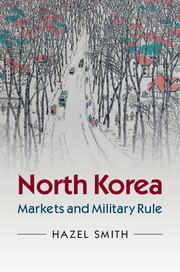Book contents
- Frontmatter
- Dedication
- Contents
- Acknowledgements
- Introduction: North Korea: politics, economy and society
- Part I Jettisoning caricatures: understanding history
- Part II The rise and fall of Kim Il Sungism
- Part III Marketisation and military rule
- 9 Marketisation from below
- 10 Military rule from above
- 11 The marketisation of well-being
- 12 The marketisation of the social structure
- 13 Going nuclear
- 14 Strategic paralysis
- 15 North Koreans as agents of change
- Bibliography
- Index
10 - Military rule from above
from Part III - Marketisation and military rule
Published online by Cambridge University Press: 05 May 2015
- Frontmatter
- Dedication
- Contents
- Acknowledgements
- Introduction: North Korea: politics, economy and society
- Part I Jettisoning caricatures: understanding history
- Part II The rise and fall of Kim Il Sungism
- Part III Marketisation and military rule
- 9 Marketisation from below
- 10 Military rule from above
- 11 The marketisation of well-being
- 12 The marketisation of the social structure
- 13 Going nuclear
- 14 Strategic paralysis
- 15 North Koreans as agents of change
- Bibliography
- Index
Summary
The goal of military-first politics was regime survival. The idea was to embed regime security against dissent at home and threats from abroad in a new system of politics in which the interests and survival of the Kim family were institutionally folded into the interests and survival of the military. Military-first politics was a response to instability generated by the famine and economic collapse of the mid-1990s, although, in an effort to secure legitimacy for military-first politics, some North Korean publications read back the foundations of military-first politics into history, at least as far as 1960. Other North Korean sources are more accurate with one Pyongyang publication attributing the first articulation of ‘Songun' or ‘military-first politics' to a 1995 New Year's Day speech made by Kim Jong Il to a military unit.
Military-first politics provided the means to achieve and operationalise regime security priorities. For the first time in the brief history of the North Korean state, the military assumed executive authority over the political sphere. Communist institutional models that conflated state and Party were maintained but the government stressed that military-first politics was a new form of political organisation. Constitutional changes in 1998 and in 2009 embedded military-first principles in law. There was no question of a switch to a democratic system based on multiparty elections. Military-first governments did not engage in structural reform of the judicial or penal system although some modernisation of the criminal law took place.
Military-first economic planning aimed to reconstruct the old command economy founded on the resuscitation of heavy industry for the same reasons that underpinned Kim Il Sungist policy. The aim was an economy that could support a military capacity that could deter or, in the worst-case scenario, defend against military intervention from abroad. Military-first era governments remained ideologically opposed to implementing a radical ‘marketisation from above' but in practice relied on the de facto marketisation that had emerged ‘from below' to deliver key priorities, including food security.
- Type
- Chapter
- Information
- North KoreaMarkets and Military Rule, pp. 235 - 259Publisher: Cambridge University PressPrint publication year: 2015
- 1
- Cited by



